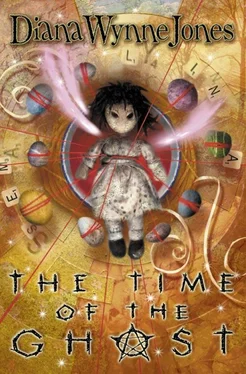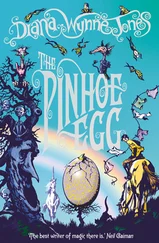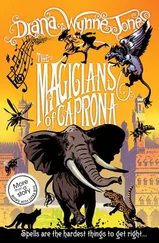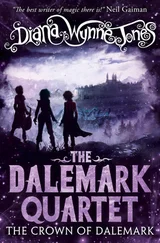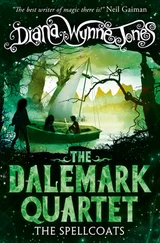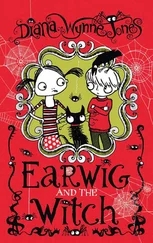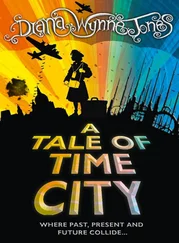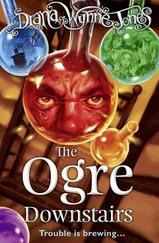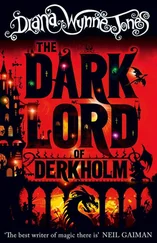But Imogen always seems unhappy! Sally said.
The papers on the treble end of the piano keys were actually browning with age. Nothing there. The picture – it was good – was more recent, but still slightly dusty. There was a film of scum on the water in the crookedly balanced paste-pot at the other end.
Here Sally noticed that Imogen had turned on the sofa to stare at her. Imogen’s eyes were large and a curiously dark blue. They had a way of looking almost blank with, behind the blankness, something so keen and vivid that people often jumped when Imogen looked at them. Sally jumped now. They were, as she remembered agreeing with Cart, unquestionably the eyes of a genius.
Imogen? Sally said hopefully.
But it was the picture behind Sally that Imogen was staring at. “I like those brambles particularly,” she said. “The stalks are just that deep crimson – brawny, I call them. They almost have muscles – tendons, anyway – and thorns like cats’ claws.”
“My self-portrait,” Fenella said smugly.
“It’s not a self-portrait. You didn’t paint it,” said Imogen. “And it makes you look too brown.” She sighed. “I think I shall take up writing poetry.” A large tear detached itself from the uppermost of her dark blue eyes and rolled down the hill of her cheek, beyond her nose.
“What are you grieving about now?” Fenella enquired.
“My utter incapacity!” said Imogen. A tear rolled out of her lower eye.
Imogen’s grieving was so well known that Sally was bored before the second tear was on its way. There was going to be no letter down here. The place to look was the bedroom. She flitted to the stairs at the end of the room, as Fenella said, “Well, I won’t interrupt you. I’m going to steal some tea.”
Sally was halfway upstairs when the door was barged open under Fenella’s hands. Oliver’s huge blurred head appeared on a level with Fenella’s face.
“Get out, Oliver,” Imogen said, lying with a tear twinkling on either cheek.
Fenella pushed at Oliver’s nose. “Go away. Imogen’s grieving.” Oliver took no notice. He simply shouldered Fenella aside and rolled into the room, growling lightly, like a heavy lorry in the distance. Where Oliver chose to go, Oliver went. He was too huge to stop. And he had detected that the peculiar Sally was here again. He shambled past Imogen to the foot of the stairs, alternating growls with whining.
“Sorry,” Fenella said to Imogen, and went out.
Sally hung at the top of the stairs, looking down at Oliver. He filled the first four steps. She did not think he would come up any farther. Oliver was so heavy and misshapen that his feet hurt him most of the time. He did not like going upstairs. But she wished he would not behave like this. It was alarming.
“Imogen’s grieving again,” Fenella said to Cart in the kitchen.
“Damn,” said Cart.
Sally gave Oliver what she hoped was a masterful look. Go away. The result was alarming. Oliver growled until Sally could feel the vibrations in the stairs. The hair on his back came pricking up. Sally had never seen that happen before. It was horrifying. He looked as big as a bear. Sally turned and fled to the bathroom, where Oliver’s growls followed her but, to her relief, not Oliver himself.
The bathroom was in its usual mess, with a bright black line round the bath and dirty towels and slimy facecloths everywhere. Sally retreated from it in disgust, into the bedroom. Here, as seemed to keep happening, she found herself being startled by something she should have known as well as the back of her hand. Perhaps it’s because I haven’t got a back to my hand at the moment , she thought, trying to make a joke out of it.
The bedroom was airless and hot, from being up in the roof. It was the size of the kitchen and sitting room downstairs, with a bite out for the bathroom, but that space did not seem very big with four beds in it. Three of the beds were unmade, of course, with covers trailing over the floor. The fourth bed, Sally supposed, must be hers. It had a square, white, unfamiliar look. There was no personality about it at all.
Another reason why the room looked so small was that it was as high as it was long. Three black bending beams ran overhead. You could see they had all been cut from the same tree. The twists in them matched. Above them was a complex of dusty rafters, reaching into the peak of the roof, which was lined with greyish hardboard. Sally found herself knowing that this part, where they lived, was the oldest part of School House. It had been stables, long before the red buildings went up beside it. She also knew it was very cold in winter.
She turned her attention from the roof and found that the walls were covered with pictures. By this time, from under the floor, through the rumbles from Oliver, she could hear Cart in the sitting room. Cart was beginning on another unsuccessful attempt to stop Imogen grieving. “Now look, Imogen, it’s not your fault you keep being turned out of the music rooms. You ought to explain to Miss Bailley.”
Sally paid no attention, because she was so astonished by the number of pictures. There were pen and ink sketches, pencil drawings, crayoned scenes, water colours, poster paintings, stencils, prints – bad and wobbly, obviously done with potatoes – and even one or two oil paintings. The oil paints and the canvases, Sally knew guiltily, had been stolen from the school Art Room. Most of the rest were on typing paper pinched from the school office. But there were one or two paintings on good cartridge paper. That brought a dim memory to her of the row there had been about the typing paper and the oil paints. She remembered Himself roaring, “I shall have to pay for every hair of every paintbrush you little bitches have thieved!” Then afterwards came a memory of Phyllis, desperately tired and terribly sensible, saying, “Look, I shall give you a pound between you to buy some paper.” A pound did not seem to buy much paper, by the look of it.
This was supposed to be an Exhibition. Sally discovered, round the bathroom corner, first a bell-push, labelled FOR EMERGENCY ONLY, and then a notice: THIS WAY TO THE EXHIBITION. The notice was signed “Sally”. But Sally had not the slightest recollection of writing it. Why was that? After staring at it in perturbation for a minute, she thought that it must have been written very recently, perhaps just after the end of term – and it was always the things in the last few days she seemed to have the greatest difficulty in remembering.
She followed her own arrows round the walls, drifting through beds and a chair in order to look closely at the pictures. Cart had signed all hers with a flourishing “Charlotte”. Imogen had signed some of hers neatly, “I. Melford”, but not all. Sally could not tell which of the rest were Imogen’s, or which were her own – if any. Then there were three signed “WH”, including one of the oil paintings, and several labelled simply “N”. N’s pictures leapt off the page at you, even though N could not draw. There was a drawing of Oliver N had done, which was a bad drawing of a bad drawing. But it was Oliver to the life, in spite of it.
I simply don’t remember any of these! Sally said. A view of the shop-cottage, unsigned. The dead elms, with blodgy rooks, also unsigned. A splendidly dismal dream-landscape by Cart. Cart went in for funereal fantasies: a coffin carried past a ruined castle in a black storm; cowled monks burying treasure; and a horrendous one of a grey, bulky maggot-like thing rising out of mist in a meadow. That one made Sally shudder and pass on quickly. Imogen, on the other hand, seemed to paint more strictly from life: flower studies, fields of wheat, and a careful drawing of the kitchen sink, piled full of thick crockery. That seemed very like Imogen. She could hear Imogen at that moment: “But I must face facts , Cart. It doesn’t matter how unpleasant they are. I can’t turn my back on reality.”
Читать дальше
